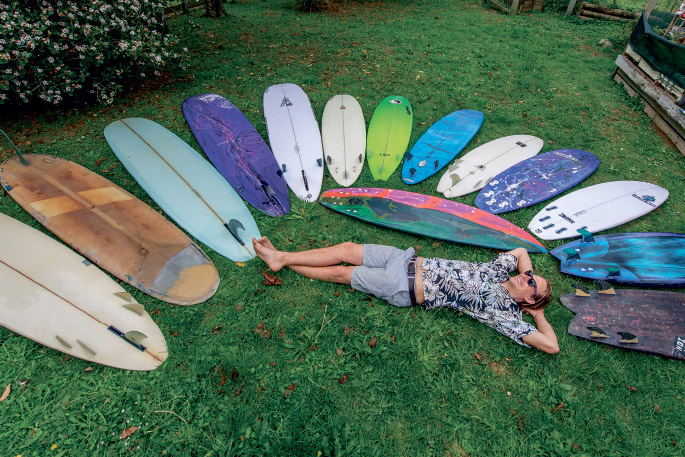It takes around five minutes in the company of Duncan Mackay to realise he knows a lot about surfing, an awful lot.
This 30-year-old Raglan resident has extensive knowledge of all aspects, from construction and the science behind it, to the actual art of riding a wave. He owns “more boards than he thought”, admitting that he may have an obsession in that area as he pulls them out for a photo.
British-born Duncan remembers bodyboarding at age four years, while holidaying with family on the Norfolk Coast in England.
“By the time I was 12 or 13, we were holidaying in Cornwall, and I was surfing the famous beaches at St Ives, Sennen Cove, Newquay and Gwynver,” says Duncan.
“Sometimes Mum and I lived in a caravan for weeks in the summer holidays, she could work from anywhere.”
His interest in the sport was so great, Duncan studied a BSc Hons in Surf Science and Technology at Plymouth University. He surfed the Cornish beaches, worked in a surf shop, and made boards of his own in the evenings.
“The degree covered many aspects, such as environmental science, oceanography, meteorology, sports science and psychology, materials science, and business studies.”
As do many surfers from around the world, Duncan visited New Zealand and was drawn to Raglan.
“I’d seen the movie ‘Endless Summer’ and Raglan is obviously very well known in the surfing world.”
He approached Mickey T of Raglan Longboards in May 2011, only to be told he didn’t need anyone now, but come back on Labour Day. Duncan did as he was told and explored other parts of New Zealand for the winter, turning up on Mickey’s doorstep again right on Labour Day 2011.
“I don’t think for one minute he thought I’d come back and his face dropped. I offered to work for $1 an hour to prove myself.
“I worked for 28 hours, he paid me $28, and took me on. He did say he’d have to re-teach me everything the right way because I’d taught myself the wrong way.”
Mickey obviously made the right decision as Duncan is still there. Duncan credits Mickey’s knowledge with his own improved construction technique over the years.
Duncan leaves the shaping in the expert care of Mickey, but he turns his hand to numerous other aspects including glassing, hot coating, fin construction, sanding, glossing, polishing, and artwork. He doesn’t do dings.
“No dings… not ever… maybe sometimes for pretty women who kiss me, put it like that.”
One of Duncan’s passions is to experiment with board design shapes, using new materials and different construction methods with “varying success.”
Nowadays, boards are made from EPS/Epoxy resins, so the boards are lightweight, strong and flexible.
“I’m always looking to improve the method of stiffening the board without using a wooden stringer as the ‘backbone’.
“I play around with different fibres such as carbon and fibreglass, and try different orientations to see how the board flexes and performs.”
Outside the 32 hours a week he works with surfboards, Duncan is a dedicated ecologist and environmentalist. For 24 hours a week, he is a Ranger for Karioi: Maunga ki te moana, a biodiversity restoration organisation working on Mount Karioi in Raglan.
“You can’t ignore the fact that the construction of surfboards uses some pretty toxic petrochemicals, that’s why I strive to make them last longer.
“You’d hope for at least 25 years from a longboard. Wood is coming back, sustainable wood is good. If we could make those boards last 50 years that would be really good.”
Duncan has never forgotten a university friend’s thesis, and the way it has made him think.
“He basically worked out that the petrochemicals used to make a surfboard would be the equivalent of the petrol for one 25 to 50 mile car journey.
“So in the big picture, owning a surfboard for 25 years is actually a low carbon emission way to enjoy the environment.”
His aim is to keep functionality and performance in a board but increase their longevity.
“There is a melting pot of talent in Raglan which I feel privileged to be part of.
“We all work together, bounce ideas off each other, and empower each other to do better.”
When it comes to actually surfing, Duncan gets out as much as he can, and he certainly has a large personal collection of boards of all sizes and shapes. He enters the Raglan Point Boardriders competitions six times a year.
“When else do I get to go out in the water with only four other people? I’ve no illusions of winning but I hold my own in the longboard division.”
Duncan has surfed at beaches all over the world, from midnight surfs in the summer white nights of Scotland, to living the beach life on the 200 kilometre Atlantic surf coast between Bordeaux and Biarritz in France.
“I also surfed in Mauritania, and no one there had even seen a surfboard. They were watching in amazement.
“Surfing around icebergs in Iceland was interesting.
“In Morocco I surfed a few kilometres of point break and rode a camel back up the beach, complete with my board.”
For Duncan surfing is a privilege and the culture is something he wants to protect.
“There is no freedom quite like riding a wave, with water and wind in your hair, and breathing in the crisp, clean air.”



0 Comments
Leave a Comment